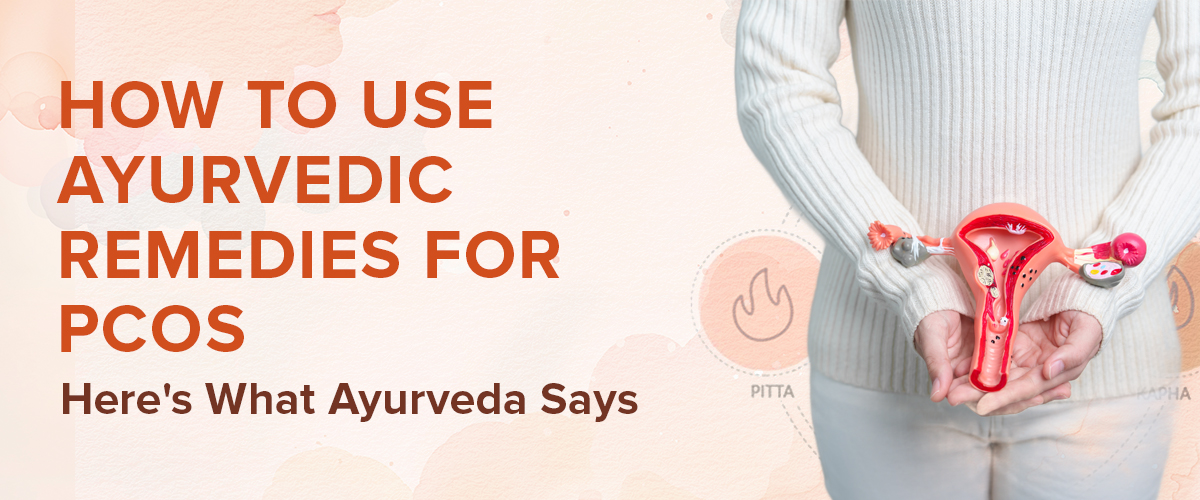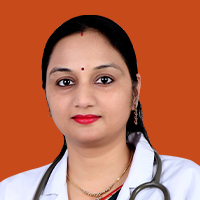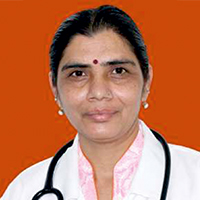As per a report published by the Press Information Bureau of India, Polycystic Ovary Syndrome (PCOS) affects between 3.7% and 22.5% of women in different parts of the country. It can also make you gain weight, get acne, have hormonal imbalances, and even make it hard to get pregnant.
So, many Indian women want to find natural, holistic ways to treat PCOS that don't involve taking drugs that are made synthetically. Ayurveda is one way to do this. This healing system uses herbs, mindful eating, simple yoga, and daily wellness routines to help your body balance itself from the inside out.
What Is PCOS and How Does It Affect Your Body?
Polycystic Ovary Syndrome (PCOS) is a common hormonal disorder that many women face during their reproductive years. PCOS could be the cause of your irregular periods, sudden weight gain, acne, or even more facial hair.
PCOS is when your body makes more male hormones, called androgens, than it normally does. This hormone imbalance has an effect on your ovaries, which are the organs that release eggs every month. Because of this imbalance, the eggs may not grow or be released correctly, which can cause small fluid-filled sacs (cysts) to form in your ovaries.
You might notice these signs of PCOS:
- Periods that are late or don't happen at all
- Gaining weight, especially around the belly
- Acne and oily skin
- Thinning hair or hair loss on the head
- Hair growing on your face or body
- Having trouble getting pregnant
- Being tired or lacking energy
- Mood swings or anxiety
These signs can have an effect on your mental, emotional, and physical health. The good news is that you can manage PCOS, especially if you know what caused it and follow a treatment that works for your body.
Why Should You Think About Getting Ayurvedic Treatment for PCOS?
A lot of women start by taking pills to help with their PCOS symptoms. These could be birth control pills to help with periods or medicines to help with blood sugar and weight. But these fixes don't last long. Most of the time, the symptoms come back when you stop taking the medicine.
Ayurveda is different. It doesn't just look at the symptoms, like acne or periods that aren't regular. It looks at what's going on deep inside your body that is causing these problems in the first place.
This is why Ayurveda is a good choice for PCOS:
It treats the root cause: Ayurveda sees PCOS as a problem with the balance of your body’s energies. Instead of covering up the symptoms, it works on correcting the imbalance from the inside.
It uses natural remedies: Herbs, spices, oils, and food play a big role in Ayurvedic healing. These are gentle on your body and free from side effects when taken properly.
It gives you a permanent answer: Ayurveda is all about habits that will help you feel better now and in the future. These habits include eating well, staying active, and sticking to a daily schedule.
It treats you as a whole person, not just your illness: Every woman's body is different. Ayurveda treats you based on your body type (dosha), your current symptoms, and the way you live your life.
What Does Ayurveda Say Is the Real Cause of PCOS?
Ayurveda says that your body is made up of three main energies, or doshas: Vata, Pitta, and Kapha. These doshas have an effect on everything, including how you feel, how your blood flows, and how your skin looks.
You feel healthy and full of energy when your doshas are in balance. But when they get out of balance, problems like PCOS can happen.
Kapha Dosha (Earth and Water): An imbalance in Kapha dosha is the main cause of PCOS. Kapha is what gives us strength, stability, and nourishment. But when it gets too high, it causes weight gain, a slow metabolism, and cysts to form in the ovaries.
Pitta Dosha (Fire + Water): Pitta is in charge of hormones and digestion. When Pitta is out of balance, it can cause mood swings, acne, inflammation, and abnormally growing hormones. These are all common in PCOS.
Vata Dosha (Air + Space): An imbalance in Vata can lead to irregular cycles, dryness, anxiety, and problems with digestion. In some women, it may also make PCOS symptoms worse.
Which Ayurvedic Herbs Help in Treating PCOS Naturally?
For thousands of years, Ayurveda has used herbs to help your body get back into balance. If you have PCOS, some herbs can help balance your hormones, make your periods better, lower your stress, and boost your fertility.
Here are some effective Ayurvedic herbs that help your body in a natural way:
Ashwagandha: Ashwagandha is known to lower stress, which is a big reason why hormones get out of balance.
Shatavari: Shatavari is an important herb for women's reproductive health. It helps keep your oestrogen levels in check and your period regular.
Turmeric: Curcumin, a strong anti-inflammatory substance, is found in turmeric. It helps with weight control, lowers swelling in your body, and makes your body more sensitive to insulin.
Cinnamon: Cinnamon is good for keeping blood sugar levels stable, which is a big problem for women with PCOS.
Neem: Neem is a natural way to clean your blood. It helps lower insulin resistance, clears up skin problems like acne, and reduces inflammation.
Ashoka: Ashoka bark helps your uterus stay healthy. It helps keep oestrogen levels in check and is good for heavy or irregular bleeding.
What Kind of Diet Does Ayurveda Suggest for PCOS?
To deal with PCOS, Ayurveda suggests a diet that calms your doshas. An imbalance in your natural energies can lead to weight gain, a slow metabolism, and the formation of cysts. Eating light, warm, and easy-to-digest foods can help balance your doshas and make your hormones healthier.
Foods you should include:
- Fresh vegetables like broccoli, spinach, carrots, cauliflower, and bottle gourd.
- Whole grains like brown rice, millet, quinoa, and barley.
- Fruits like apples, berries, and pomegranates are good for you, but avoid very sweet fruits like bananas and mangoes.
- Legumes like lentils, chickpeas, and mung beans.
- Spices that are good for you include ginger, turmeric, cumin, black pepper, and cinnamon.
- Dairy with low fat, like buttermilk (don't eat curd at night)
- Almonds, flaxseeds, and pumpkin seeds are examples of nuts and seeds that are good for your menstrual health.
Foods to avoid:
- Foods that are cold or refrigerated (they slow down digestion)
- Foods with sugar in them, like sweets, desserts, and drinks
- Food that is deep-fried and greasy
- White bread, maida, and junk food
- Too much dairy and red meat
What Ayurvedic Therapies Are Used for Long-Term PCOS Management?
Ayurveda's Panchakarma therapies are very helpful for long-term management of PCOS. These are time-tested detox treatments that help your body get rid of toxins, balance your hormones, and make you healthier overall. If you've been getting treatments but your symptoms keep coming back, Panchakarma might be the deeper reset your body needs.
Five Panchakarma treatments that are often used for PCOS are:
- Vamana (therapeutic vomiting): This is a planned therapy in which the body gets rid of toxins by vomiting. It might sound harsh, but when done by a professional, it helps get rid of extra Kapha and balance hormones.
2. Virechana (Herbal Purgation): This treatment uses herbal laxatives to help the body get rid of toxins through the bowels. It helps keep your periods regular and your liver healthy.
3. Basti (medicated enema): This is one of the most important treatments for PCOS. It involves putting medicated oils or herbal teas into the rectum. It makes the reproductive system stronger, balances Vata dosha, and helps with regular ovulation.
4. Udvartana (dry powder massage): This is a full-body massage that uses special herbal powders. It helps you lose weight, improves blood flow, and is great for dealing with weight gain and fluid retention that come with PCOS.
5. Nasya (Nasal Therapy): This treatment involves putting herbal oils or powders into the nose. It helps keep your emotions in check, helps you sleep better, and keeps your periods regular.
Final Thoughts
As women, it can be hard to deal with PCOS. But the truth is that you have more power than you think. Ayurveda is a gentle, natural way to take care of your health. Everything, from herbs like Ashwagandha and Shatavari to simple changes in diet and lifestyle, adds up to real, lasting progress.
Taking small steps like drinking warm water, doing yoga, or sticking to a regular sleep schedule can make a big difference. You don't have to hurry. Just get started. If you're not sure, talk to a Jiva certified Ayurvedic doctor who can help you based on your specific needs.
FAQs
1. What is the best way to treat PCOS?
There is no single cure for PCOS, but using Ayurvedic remedies, eating well, exercising every day, and managing stress can help you feel better in the long run and bring your body back into balance.
2. What are the signs that you might have PCOS?
You might notice that you miss your periods, gain weight quickly, get acne, grow extra facial hair, or have trouble getting pregnant. These are signs that your hormones may not be in balance.
3. How to get pregnant when you have PCOS?
Eat well, practise Ayurveda, manage stress, and get ovulation support to balance your hormones and improve your chances. Talk to your doctor about a fertility plan that works for you.
4. What is the main reason for PCOS?
Hormonal imbalance is the main cause, and it can be brought on by stress, a bad lifestyle, insulin resistance, or genetics. Ayurveda says it's a dosha imbalance, mostly Kapha.
5. What does the PCOS discharge look like?
Hormonal changes can cause vaginal discharge to be thick, white, or sticky. If it smells bad or makes you itch, see a doctor to make sure it's not an infection.
6. Is it possible for PCOS to go away on its own?
PCOS doesn't go away completely, but natural remedies, lifestyle changes, and regular health tracking can help a lot with your symptoms. With the right approach, it can be handled timely.























































